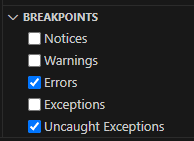Exceptions and Errors
The PHP Debugger provides developers with tools to handle exceptions during the debugging process. This functionality enables you to break when all or specific exception happens during script execution. This allows you to inspect the state of your application precisely at the point where the error occurred.
Handling Exceptions and Errors in VS Code
When developing PHP applications, you may encounter a range of issues, including notices, warnings, errors, and exceptions. From PHP 7 onwards, many errors are represented as exceptions, which can be managed more flexibly. The PHP Extension for Visual Studio Code enables effective handling of both traditional PHP errors and modern PHP exceptions.
Breaking on Specific Exception Types
Visual Studio Code allows you to control which issues trigger a breakpoint during debugging. The Breakpoints panel offers a straightforward way to configure these settings. Available options are:
- Notices: Breaks when a PHP notice is triggered (e.g., accessing an undefined variable).
- Warnings: Breaks when a PHP warning occurs (e.g., including a file that does not exist).
- Errors: Breaks on PHP errors, such as fatal errors (e.g., calling a non-existent function) that stop the execution of the script.
- Exceptions: Breaks when a PHP exception is thrown, such as a custom throw or built-in exceptions like
RuntimeException. - Uncaught Exceptions: Breaks when an exception is thrown but not caught by any
try-catchblock, leading to script termination.
How to Configure Exception Breakpoints
To set up exception breakpoints in Visual Studio Code:
- Open your PHP project and navigate to the Run and Debug view.
- Expand the Breakpoints panel.
- Select the types of exceptions or errors you wish to break on during execution.

This ensures that when your PHP code encounters a specified issue, the debugger will pause, allowing you to inspect the program's state.
Customizing Exception Handling in launch.json
For finer control over debugging behavior, you can modify the launch.json configuration file. The ignoreExceptions setting allows you to specify exception class names or patterns that should be ignored by the debugger.
Example launch.json Configuration:
{
"configurations": [
{
"name": "Listen for XDebug",
"type": "php",
"request": "launch",
"ignoreExceptions": ["MyNamespace\\SpecificException", "CommonError*"],
"program": "${file}"
}
]
}This setup will prevent the debugger from breaking when MyNamespace\\SpecificException or any exception matching CommonError* is thrown.
Viewing Exceptions in the Debug Console
Whether or not the debugger is set to break on an exception, you can still see output in the Debug Console when an exception or error occurs. For example, an uncaught exception will display:

Unhandled Exceptions and Fatal Errors
Unhandled exceptions in PHP are treated as fatal errors, terminating the program if they are not caught with a try/catch block. The debugger will automatically break when such exceptions occur, giving you a chance to inspect the program state at the time of failure.